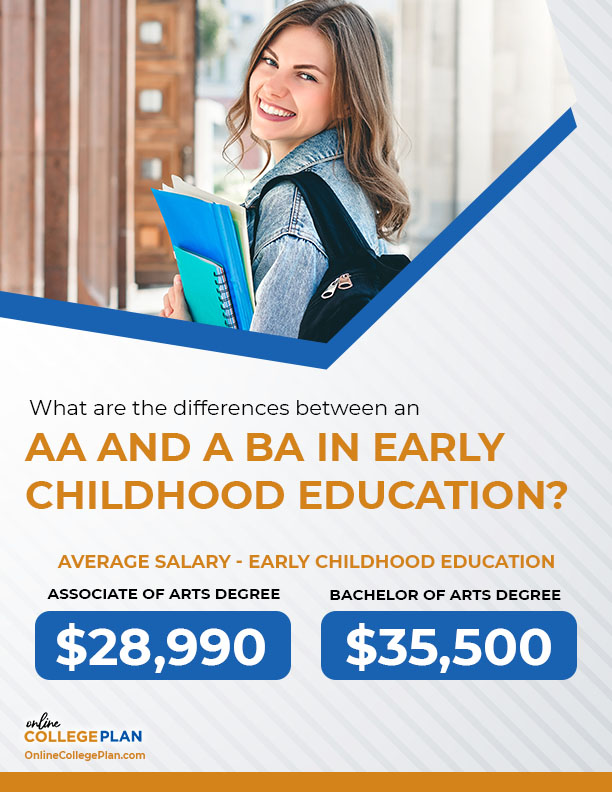What are the Differences Between an AA and a BA in Early Childhood Education?
Find your degree
By Jennifer W. Eisenberg

Are you interested in learning about the differences between an associate degree and a bachelor’s degree in early childhood education? This article will help you out!
See Also: What Can You Do With an Early Childhood Education Degree?
Early Childhood Education: The History
The history of early childhood education starts with the Industrial Revolution. Children were no longer needed to work on the farm. And some thought these urchins were clogging the streets of cities and towns with play and general shenanigans, so something had to be done with them.
One enterprising mill owner had the idea to bring uniformity to their training with a school to produce obedient future mill workers who could read and work with numbers. This gave birth to the kindergarten movement. This movement grew across Western countries in the 19th and 20th centuries to become what it is today in the US.
Clearly, early childhood education has definitely expanded its scope since then. It has grown to cover every facet of childhood, from their special dietary needs to their developmental stages and physical skills. One arm of the practice in this field is to allow for early intervention in diagnosing and treating many conditions that arise in childhood, like speech difficulties, delays, and autism. And it is the experts in early childhood education who catch these issues early and help to treat kids with interventions. Many also serve to keep the young ones safe while their parents work or are otherwise engaged. States have differing requirements for positions dealing with young children, but all of them will require at least some schooling and a clean background check.
This article will illustrate the different positions available to those with different levels of education in the area of early childhood education, specifically, associate and bachelor’s degree programs.
See Also: Top 20 Online Bachelor’s in Early Childhood Education

Hours of College Credit
Both an associate’s degree and a bachelor’s degree in early childhood education can be obtained online or in a traditional college setting. The main difference between the two degrees is the additional two years of study that the bachelor’s (roughly 120 semester hours) affords, as the associate’s (roughly 60 semester hours) parallels almost exactly with the first two years of study for the bachelor’s degree. These additional four semesters give students time to really dig into 300 and 400-level classwork in the field and maybe even develop a specialization.
That is much more difficult at the associate level, though specialized associate degrees in child development and the like are available. The associate of arts in early childhood education usually can be completed in four semesters or two calendar years. The bachelor of arts in early childhood education (predictably) takes twice as long, though both can be shortened considerably with the transfer in of previously earned college credit. Some credits may be applied that were not earned in the classroom, but are a result of on-the-job training or life experience. This is always an option worth exploring if you have any kind of history of professional work or training. Both degrees can be pursued totally online. And only the supervised practicum portion involves face-to-face contact.
Students would be wise to consider pursuing their ECE or child development degree online, for it is in no way a step down from traditional study. The same courses are taught by the same professors (largely) in both online and on-campus classes, and the same degree is awarded at the end of the process with no signifier to notate on the paper of the degree itself that online study was used. In addition, much time, money, and energy may be saved by attending virtual classes.

Degree of specialization
A bachelor’s degree in early childhood education features 40-50 hours of coursework just in the major, whereas much of the 60 hours of coursework in the associates of early childhood education is general education coursework that does not explicitly relate to the major. Some courses covered by the bachelor’s degree programs include the following: early language and literacy; differently-abled children; various forms of assessment; and relationships in the family and community. Some associates of early childhood education do specialize somewhat by focusing on child development or the skills needed for working in childcare, but the degree of specialization is very limited due to the time constraints of the degree.
Ease of transfer between an associate in ECE and a bachelor’s in ECE
If you are currently pursuing an associate’s degree in early childhood education, you might keep your eye on the goalpost marked “bachelors.” The pay differential between these two degrees is significant and will make a difference in your quality of life if more school is a possibility for you. As was said before, the associates in early childhood education basically serves as the first two years of the bachelor’s in early childhood education. So once you have finished this first step, you are literally halfway to the second step.
Many community colleges have transfer agreements with four-year schools to help ease the transition and maximize transferable credits. Check out what your current school offers in this department. Some two-year schools even offer scholarships for students going on to a bachelor’s. Any other preexisting college credit you have may also be applicable here. So, yes, an associate is literally half of a bachelor’s degree. You are literally leaving money on the table by not investigating the options opened up for you with the second half of this degree.
Income
Another notable difference between the two degrees is pay discrepancy. Baccalaureate degree holders in early childhood education are remunerated much more highly and securely than associate degree holders in early childhood education. Those with an associate degree are often paid on an hourly basis and employed in at-will childcare situations.
In contrast, bachelor’s degree holders often work for school systems as year-round employees with the option of tenure in some circumstances. These jobs can offer more permanence and stability. Those with associates in early childhood education can expect upwards of $11 per hour, or roughly $23,000 per year, depending on the location of the work and the worker. Individuals with a bachelor’s degree in early childhood education can expect a starting salary in the mid-30s to low-40s range. With the addition of a master’s degree (eventually), salaries can reach the mid-80s if one chooses to go into management or consulting.
Locations that pay a better rate for childcare and education generally have higher costs of living associated with them. Therefore, a seemingly lower paying job in a lower cost of living area may actually furnish your needs better than a higher paying job in a higher rent area.

Job title differences (lead teacher vs. auxiliary teacher, etc.)
There is some overlap in positions available for those with associates in early childhood education and those with a bachelor’s in early childhood education. Obviously, anyone with a bachelor’s could apply for a position requiring only an associate’s degree, and some with just an associate’s degree climb the corporate ladder to positions of management without a baccalaureate degree. Some job titles available to early childhood education associate of arts degree holders include Head Start teacher, preschool and kindergarten teacher’s aide, daycare center worker, home-based childcare provider, or (with sufficient supervisory experience) daycare center manager.
For holders of the bachelor of arts degree in early childhood education, the positions you can apply for include these: preschool teacher; elementary school teacher; home-based childcare service provider (ie, a nanny); researcher; or daycare center manager. Whichever path you take, the US Government’s Bureau of Labor and Statistics predicts positions in the childcare field, in general, to grow at a rate of 2% relative to the total economy (which is a little slower than the average of 4%). Most positions that open up are because of individuals leaving the profession permanently. Despite the inarguable need for childcare, its cost can be prohibitive and thus drive down demand for this critical service, which in turn depresses hiring. Also, post-generation-X generations are not having children at the same rate, so one could call this another industry endangered by millennials if that was a thing one wanted to do.
Certification differences
All early childhood education positions will require a clean background check. You must be fingerprinted and run through the system. Certification varies by position, title, and location, but often includes a degree, a supervised practicum with children, and the passage of a state or official test. Some positions do not insist on a degree, but you must have a certain amount of hours of class time in certain subjects and be otherwise certified.
One such certification is the Child Development Associate Credential, which is a widely recognized achievement that many states accept as part of their licensure qualifications for those with an associate’s in early childhood education. This credential is issued by the Council for Professional Recognition and requires 120 in-class hours of instruction, including ten hours each in child development areas that are listed on their website.
Students must also distribute family questionnaires to the families they serve and have these questionnaires reviewed as part of the professional portfolio that is submitted as a step in the certification process. Other steps include 480 hours of supervised work with children and an exam. The process costs around $500, but there are discounts available, and in some cases, your state will pay for you to be certified. Some states have their own certification tests and requirements for jobs such as preschool teachers. Massachusetts, for example, requires a bachelor’s degree, 300 hours of field experience, and the passage of two tests before licensure can occur.
However, in Wyoming, merely completing the aforementioned Child Development Associate credential is enough to serve as the completed pathway to becoming a preschool teacher. It is one entry on a long list of possible qualifications. Arkansas asks that preschool teachers complete a licensure preparation course and pass the ensuing examinations to achieve licensure, and then they participate in the Arkansas Better Chance Program. Licensure in the Natural State is open only to holders of bachelor’s degrees. The Child Life Specialist is another credential available to those with a bachelor’s degree in early childhood education. Holders of teaching certificates in any state or district must be familiar with and follow the rules for renewal.

Obviously, your viability as a future graduate student will be enhanced with a BA rather than with only an AA in early childhood education. You may have clear future designs on getting an advanced degree with a cunning balance of locally taken community college requirements that you can build on as you transfer into the best program to finish the bachelor’s. You may even be able to complete yours without tuition costs, as a number of states are moving to free community college for all. You may find it most beneficial then to look into combined BA-MA programs, many of which can be completed online.
Take care to consider that each level has inherent challenges, and you may have to space out the schooling you have in mind. Without a doubt, colleges are feeling pressure to increasingly allow students to pace things in as flexible a manner as possible, especially with such a sharp recent increase in distance learning and rolling deadlines–not to mention the non-traditional population against whom you will also be in competition. Be aware that virtual learning allows you to set your own pace more than you could by attending a traditional institution. Of course, that goes as well for students who will be both your likely colleagues and/or rivals, depending on your temperament and approach.

We hope that this article has been clear in illustrating the differences between an associate of arts in early childhood education and a bachelor of arts in early childhood education. Many distinctions will vary based on geographic location and services available where you are. Others are firm across the board according to national guidelines. You will certainly need to get serious advice from those with those degrees, those in the field currently, as well as faculty. Once you have best understood what suits you most, you will probably be thankful for the range and quality of advice you have sought.
